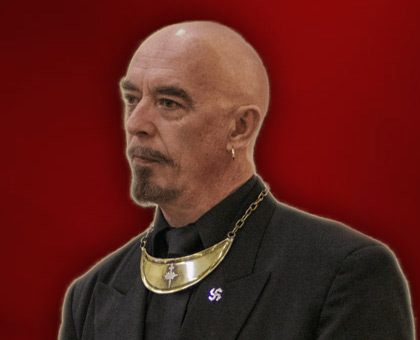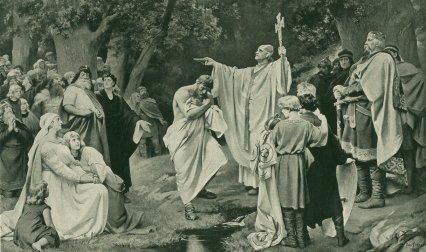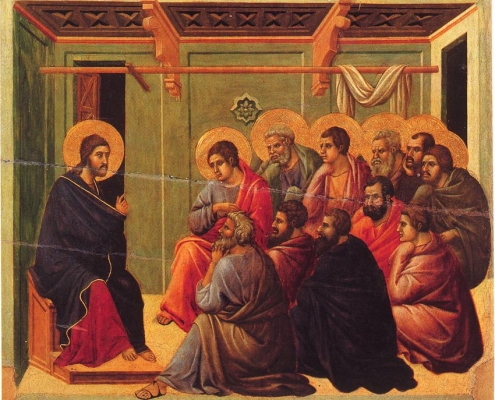
Perseverence in Odinism
OR and OdinismPerhaps one of the most overlooked of the Noble Virtues is Perseverance. It doesn't appear at all exciting. Rather dull in fact. Far better to be where the action is than just plodding away quietly. But without perseverance nothing comes to pass and the action, while briefly exciting, is often ultimately futile.

An Odinist view of Original Sin
OR and OdinismChristianity's morbid emphasis on man's sinful nature and on the fall from grace not only leads to the cults of confession, penance and self-mortification, which seem so antiquated and perverse to naturally minded people nowadays; it also encourages a sense of utter dependence, both moral and spiritual, on a god.

ODINISM AND PRIDE
OR and OdinismThe Odinic code is natural, life-affirming, and noble, and very often in direct contrast to the Judeo/Christian code. This is seen in many examples, but for the sake of space let us look at just one - PRIDE.

Odinism and Christianity
OR and OdinismI do not accept that the Edda of Snorri Sturluson is a true reflection of our faith and religion. As a member of the family of clans of Northern Europe, he was in possession of the truth of our faith, but he chose to dishonour himself by distorting that truth and betraying our Gods and his own kindred.

ODINISM – Our Faith, Heritage and Identity – Part 3
OR and OdinismWhen our faith was supplanted by the alien creed from the Levant and its later outgrowth, materialism, our Gods did not cease to exist, but our people ceased to recognise them. Though buried beneath layers of poison, the roots of our faith remained.

ODINISM – Our Faith, Heritage and Identity – Part 2
OR and OdinismOdinism is not a rigidly dogmatic religion. Many approaches to our faith exist, and function side by side, but there must be recognisable parameters within which it operates or our identity is obscured or lost.

ODINISM – Our Faith, Heritage and Identity – Part 1
OR and OdinismThe Odinic Rite celebrates our own unique Folk Faith, and in present day society its existence is in itself something to celebrate because it affirms that against huge odds our Holy Faith has never died.

Odinism and Magic
OR and OdinismI have heard it said that 'Magic has nothing to do with Odinism', which is singularly uninformed comment when it is seen that Odin, among much else, is a God of Magic. Furthermore, magical acts by Gods and men run throughout our myths and sagas. I do not, in this article, intend to define what Magic is. Suffice it to say that in its widest sense it permeates all and that certain of its aspects have been categorised as ESP, telepathy, natural science, and occultism.

Let Us Be True to Ourselves
OR and OdinismODINISM is one of the few religions that has not altered its beliefs to fit in with current fashion. The universalist religions, on the other hand, tend to change their spiritual principles in order to accommodate people of widely differing background and culture and in many ways the modern Christian church appears to be more of a political institution, with its ethical values being more political than spiritual in nature.

The Christian Doctrine of the Incarnation – An Odinist view
OR and OdinismOF ALL the doctrines of the Christian church it is the Incarnation which, the Christians themselves boast, distinguishes theirs most from other religions, both monotheistic and polytheistic. The Incarnation describes the Christians' belief that a god came down from heaven to earth and became a man.

Agnosticism Defies Belief
OR and OdinismAgnosticism, of course, is not a wholly unreasonable viewpoint, just the result of a false line of enquiry. The agnostic attempts to assess objectively the merits of the believer's faith in the existence of god or gods by examining the evidence. He concludes that since a god cannot be apprehended by man's physical senses no evidence with any bearing on the question is available. He says, 'seeing is believing. I do not see. Therefore I do not believe'.

Academic Balance
OR and OdinismHeimgest CG urges us not to rely too much on academia to the detriment of the natural essence of our faith and suggests that although an 'outsider' may have extensive academic knowledge of Odinism, or an aspect of it, this can never equal the inner, intuitive knowledge and appreciation that comes from a person actually and directly experiencing our living faith.
